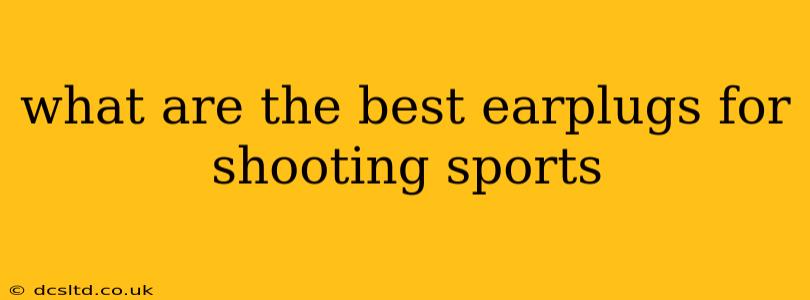What Are the Best Earplugs for Shooting Sports? Protecting Your Hearing on the Range
Shooting sports are exhilarating, but the intense noise can cause permanent hearing damage without proper protection. Choosing the right earplugs is crucial for safeguarding your hearing while enjoying your favorite activities. This guide will help you navigate the options and find the best earplugs for your shooting needs. We'll also address some frequently asked questions to ensure you're fully informed.
Factors to Consider When Choosing Earplugs for Shooting:
Before diving into specific recommendations, let's consider the key factors influencing your choice:
- Noise Reduction Rating (NRR): This rating indicates how much the earplugs reduce sound levels. Higher NRR means more protection, generally ranging from 22 to 33 decibels for shooting earplugs. However, real-world performance can vary.
- Comfort and Fit: You'll need earplugs that are comfortable enough to wear for extended periods. Poorly fitting earplugs can reduce their effectiveness and lead to discomfort. Consider the shape and material—foam, silicone, or custom-molded.
- Type: Earplugs come in various types, including foam, silicone, and custom-molded. Each has pros and cons regarding comfort, reusability, and cost.
- Attenuation: This refers to how the earplugs reduce specific frequencies of sound. Shooting earplugs should reduce high-frequency sounds (the most damaging) without completely muffling important cues like range commands.
- Hygiene: Reusable earplugs require cleaning and proper storage to prevent bacterial growth and maintain hygiene.
Types of Earplugs for Shooting Sports:
-
Foam Earplugs: Disposable and inexpensive, foam earplugs are easy to use but offer less consistent protection than other options. Their NRR can vary depending on the brand and how well they're inserted.
-
Silicone Earplugs: Reusable and more durable than foam earplugs, silicone options provide a more consistent fit and NRR. They come in various shapes and sizes for better comfort and fit.
-
Custom-Molded Earplugs: These offer the best fit and protection, providing a superior seal and tailored attenuation. They are more expensive but offer long-term value and enhanced comfort. A professional audiologist creates custom-molded earplugs to precisely fit your ear canal.
-
Electronic Earplugs: These offer the best of both worlds - hearing protection and situational awareness. Electronic earplugs amplify softer sounds, such as range commands, while suppressing harmful loud noises.
What are the best earplugs for shooting sports?
It's impossible to name the single best earplug, as the optimal choice depends on individual preferences, budget, and shooting style. However, many shooters find that high-quality silicone reusable plugs or electronic earplugs offer an excellent balance of protection, comfort, and value. Research reviews and compare different brands to find a model that suits your needs.
What is the best NRR for shooting earplugs?
A higher NRR is generally better, aiming for at least 22 dB for most shooting activities. However, an excessively high NRR might muffle important sounds. The sweet spot is often around 25-30 dB.
Are earplugs or earmuffs better for shooting?
Both earplugs and earmuffs offer hearing protection, but many shooters prefer using both simultaneously for maximum protection. Earplugs provide a closer fit, while earmuffs add an extra layer of protection and reduce surrounding noise.
How do I clean my reusable shooting earplugs?
Always follow the manufacturer's instructions. Generally, you should clean your earplugs with mild soap and water and allow them to air dry completely before storing.
Do electronic earplugs work well for shooting?
Yes, many shooters find electronic earplugs beneficial, as they allow for communication and awareness of surrounding noises while still protecting hearing from the loud bangs of gunfire. They offer a good compromise between hearing protection and awareness.
Choosing the right earplugs is a personal decision. Consider the factors above, read reviews, and consider trying a few different types to find what works best for you and your shooting activities. Remember, protecting your hearing is paramount for the long-term enjoyment of shooting sports.
